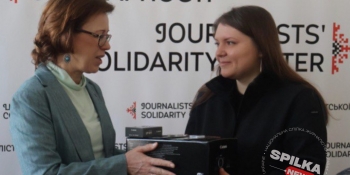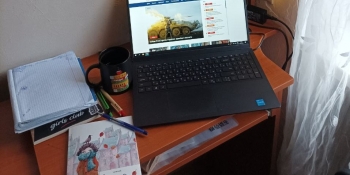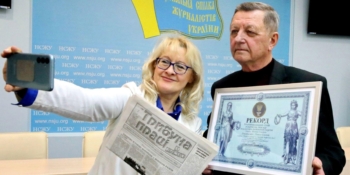Despite the fact that after the latest Russian strikes Odesa was left without electricity for several days, and the situation there is still unstable, journalists there still honestly fulfilling their professional duties. The press service of the National Union of Journalists of Ukraine (NUJU) learned how journalists manage to do this from newspapermen and TV presenters in Odesa.
– We publish three newspapers called After Retirement [Na pensii], Odesa Life [Odeske zhyttia], and Pension TV Program [Pensiina teleprograma]. We have had the generator for a long time: it is about ten years old. Previously, when failures occurred once every six months, we had it as a backup. Now, in addition to it, we have a charging station, which we received from the Association of Independent Regional Publishers of Ukraine,” said the editor-in-chief of the publications Hennadii Chabanov.
Mr. Chabanov notes that problems with the Internet still remains, but at the moment, the editorial office is trying to solve them as well: they will connect the office to an optical fiber. The editors also decided to purchase a set for the Starlink satellite system. Prior to that, employees had been distributing the Internet from mobile phones to their computers. This Internet is not very fast, but it was possible to make newspapers and fill websites. Some employees used the capabilities of Invincibility Points: they took a laptop and went to the place where the Internet is currently available.
– Last Tuesday, when we were making newspapers, the generator worked for ten hours. It was a success, says Hennadii Chabanov.

Odesa television company Channel 7 is forced to work 1.5-2 hours a day, starting at 6 p.m., due to power outages. It is possible to make several news releases, run a website and a Telegram channel. Most of the time, the channel broadcasts a telethon.
– Since our office mostly stays without electricity (only the server room can work from the generator), we write interviews in other locations. That is, we can only edit videos and broadcast without interruption: several computers are powered up, said Oleksandr Poluiev, the Chief News Editor of Channel 7.
To record interviews, film crews have to travel to a nearby business center that has a powerful generator.
– The management of the business center met us hallway and provided an opportunity to record interviews. And a few days ago, they recorded an interview at the InterChem industrial enterprise. In other words, we get out of it as much as we can…, says the journalist.

The editors of the publications add that in blackout conditions, different editorial offices try to help each other: those with stable electricity invite colleagues from other publications to work in their offices.
On Monday, the lights were turned on in a part of Odesa. In some places there was electricity only at night, in others the electricity supply lasted all day.
NUJU continues cooperation with international donors to provide journalists with chargers, generators and power banks in conditions of blackouts!
Maksym Stepanov, the information service of NUJU
Photo provided by Odesa-based mass media
























